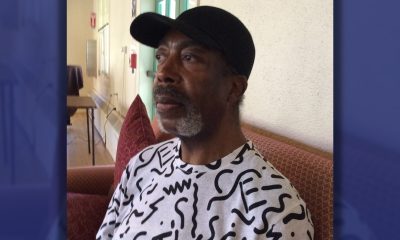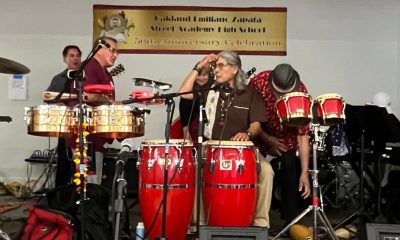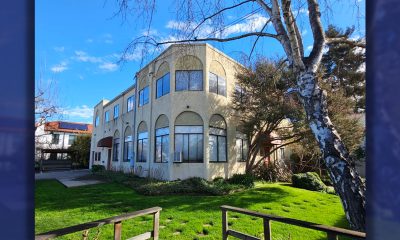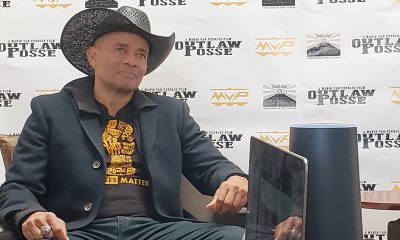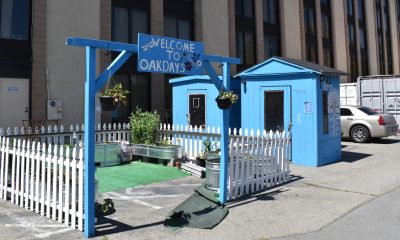Crime
Keith Warren, Formerly Incarcerated but Molded for Greatness
For many formerly incarcerated men and women, the obstacles to reentering society and piecing their life back together can be challenging.
For barber Keith Warren, the driving motivation was to take his life back, become a business owner and a productive citizen of society.
Part owner of the 730 Barber Lounge in downtown Oakland – across from the Wiley W. Manuel Courthouse – Warren says he had to change his mindset as he tried to achieve the goals he set for himself.
Throughout his journey, from being a store manager at Kentucky Fried Chicken (KFC), to serving time in prison and now a successful barber, he refuses to fail and feels he is molded for greatness.
“It’s so important for me to be successful in what I do. I’m not just talking [about it], I’m doing it,” he said.
“In a nutshell, at some point in life after doing things wrong, you have to wake up and do things the right way,” he said, “no shortcuts, because it’s going to last.”
Warren was given the opportunity to attend Barber College with help from the Oakland Private Industry Council (PIC) and now wants to extend that same opportunity to others.
He plans to open a barber college in the Bay Area where he “can help other young men and teach them how to cut hair and provide for their families.”
“It’s just about finding where your niche is,” Warren said. “Start thinking long-term; you have to go from a trade to a business owner, to owning corporations, to giving other people opportunities. We have to do things to instill family morals and ethics in the Black community.”
The barber says he advises many young men and women who are caught in the justice system to avoid the “red tape.”
“They know the people who are going to successfully finish parole and those who are not; it’s almost like the real from the fake,” he said. “You have to change your mindset into being a productive member of society instead of being a hooligan or street punk.”
Warren says his strong faith has helped keep him on track. “When God is trying to elevate you, it’s a feeling you never felt before,” he said. “I’m basking in His glory, that’s how I live my life.”
Although the 730 Barber Lounge will be closing its doors in December, Warren looks forward to continuing his business in another location and working towards opening his barber college.
For more info, contact Keith Warren at 510-472-4163 or keithwarren510@gmail.com.
Bay Area
Justice for Henry Texada
Henry Texada was known as a leader, a role model, godfather, and a friend to all. He enjoyed mentoring younger members of his family and participants at the Boys and Girls Club. He was always giving and present in the lives of others with a kind word or suggestion. Henry used the skills gained at Youth Radio as a digital media photographer to inspire others. He wanted to learn as much as he could to be a supportive person for youth, so he enrolled at Laney College for the fall of 2020 for classes in Early Childhood Development. He was killed when several people exited a 2020 silver Nissan Armada and shot him around 2 p.m. on April 28, 2020, on 68th Avenue in East Oakland.

Family Seeks Justice for Murdered Son on Fourth Anniversary of His Death
Special to The Post
Henry Texada was known as a leader, a role model, godfather, and a friend to all. He enjoyed mentoring younger members of his family and participants at the Boys and Girls Club. He was always giving and present in the lives of others with a kind word or suggestion.
Henry used the skills gained at Youth Radio as a digital media photographer to inspire others. He wanted to learn as much as he could to be a supportive person for youth, so he enrolled at Laney College for the fall of 2020 for classes in Early Childhood Development.
He was killed when several people exited a 2020 silver Nissan Armada and shot him around 2 p.m. on April 28, 2020, on 68th Avenue in East Oakland. Police were able to recover the vehicle, which had been rented in Reno, Nev., but have been unable to solve the case.
Henry’s senseless murder continues to deeply impact his loved ones who are suffering from his loss.
“I hate the phrase passed away or died,” his mother says. “My son, Henry, was very protective of me, and we had a bond that could not be broken. I miss him so much.
“I hate April 28th because I feel Henry should be here, because he had a purpose helping others and working with youth. He was physically strong and had a plan, goals, and dreams. Henry had a smile that would light up the room. He is a wonderful son, brother, and uncle.”
“Instead of imploring you for information and help, I should be telling you about all the things he has achieved and all the people that he touched,” his mother said. “But instead, here I am praying for justice because a person who would take the shirt off his back for others was murdered.
“There is no word to describe this everyday pain for me. I expect him to text me at any moment because his favorite saying was “don’t say bye, say see you later.” It’s four years later and I can’t physically hold him,” his mother comcluded.
The Family Support Advocates join with Henry Texada’s grieving family and loved ones in their pursuit of justice. Anyone in the community with information about Henry’s murder is asked to contact the Homicide Section of the Oakland Police Department at (510) 238-3821 or the TIP LINE at (510) 238-7950. CrimeStoppers of Oakland is offering a reward for an arrest in this case. #JusticeforHenry.
FAMILY SUPPORT ADVOCACY TASK FORCE
The mission of the Family Support Advocacy Task Force, a committee of the Violence Prevention Coalition, is to advocate for local, state and federal policies and legislation to enhance and expand support to families and friends of those who experienced violence; for more compassionate and transparent communication between law enforcement, the district attorney with the family of homicide victims and to push for the elimination of all violence, but particularly gun violence and homicides.
Activism
Calif. Anti-Sex Trafficking Advocates Discuss Competing Bills, Strategies
Advocates from across California are challenging state officials and community leaders to support legislation that provides resources and services for survivors and victims of human trafficking, as well as assistance as they transition back into civil society. Some of those advocates are also calling for more effective state policy to curtail trafficking, a crime that has an outsized impact on Black children, particularly girls.

By Bo Tefu, California Black Media
Advocates from across California are challenging state officials and community leaders to support legislation that provides resources and services for survivors and victims of human trafficking, as well as assistance as they transition back into civil society.
Some of those advocates are also calling for more effective state policy to curtail trafficking, a crime that has an outsized impact on Black children, particularly girls.
According to the FBI, a report covering a two-year period found Black children accounted for 57% of all juvenile arrests for prostitution. In addition, 40% of sex trafficking victims were Black and 60% of those victims had been enrolled in the foster care system.
“It is time to hold the perpetrators who take advantage of our children accountable,” said the Rev. Shane Harris, a San Diego-based activist, former foster youth and founder of the Peoples Association of Justice Advocates, (PAJA), a national civil rights organization and policy think tank.
“It is time to send a thorough message that if you seek to buy a child for sex, you will pay the highest criminal penalties in this state,” added Harris who was speaking at a rally at the State Capitol earlier this month. Harris was speaking in support of Senate Bill 1414, authored by Sen. Shannon Grove (D-Bakersfield), which calls for people who buy sex from minors to be punished with a felony. The punishment includes a two-year prison sentence and a $25,000 fine.
Harris said the PAJA is the only civil rights organization in the state that supports SB 1414.
Harris urged other Black-led groups who favor anti-trafficking legislation more focused on criminal justice reforms (as opposed to stiffer penalties), to “join the movement.”
Many of those civil rights groups fear that SB 1414 could lead to the incarceration of more Black youth.
Those sentiments were echoed in a panel discussion organized by Black women advocates on April 26 to examine the cause and effects of human trafficking in California’s Black communities. The virtual event was hosted by the Forgotten Children, Inc, a faith-based nonprofit that advocates for survivors and victims of human trafficking through anti-trafficking campaigns and initiatives.
Panelists shared the psychological impact of sexual exploitation on youth and children in the long term.
Author and educator Dr. Stephany Powell shared statistics and information revealing that African American women and girls are the most trafficked nationwide.
Powell, who serves as the senior advisor on law enforcement and policy at the National Center on Sexual Exploitation said that national data indicates that sex trade survivors are disproportionately women of color. She stated that male survivors often go unnoticed because boys rarely report trafficked crimes.
Powell said that decriminalizing prostitution in California could increase human trafficking. She argued that Senate Bill 357, authored by Sen. Scott Wiener (D-San Francisco), which was signed into law in 2022 and legalized loitering for prostitution, caused a surge in street-level prostitution.
Panelist and psychologist Dr. Gloria Morrow shared opposing views on decriminalizing prostitution. She said that decriminalizing prostitution could help survivors gain access to state resources and support.
Despite opposing views, Powell and Morrow agree that the Black community needs resources and educational programs to address human trafficking.
Activism
Oakland Post: Week of May 1 – 7, 2024
The printed Weekly Edition of the Oakland Post: Week of May 1 – 7, 2024

To enlarge your view of this issue, use the slider, magnifying glass icon or full page icon in the lower right corner of the browser window. ![]()
-

 Community2 weeks ago
Community2 weeks agoFinancial Assistance Bill for Descendants of Enslaved Persons to Help Them Purchase, Own, or Maintain a Home
-

 Activism4 weeks ago
Activism4 weeks agoOakland Post: Week of April 3 – 6, 2024
-

 Business3 weeks ago
Business3 weeks agoV.P. Kamala Harris: Americans With Criminal Records Will Soon Be Eligible for SBA Loans
-

 Activism3 weeks ago
Activism3 weeks agoOakland Post: Week of April 10 – 16, 2024
-

 Community3 weeks ago
Community3 weeks agoAG Bonta Says Oakland School Leaders Should Comply with State Laws to Avoid ‘Disparate Harm’ When Closing or Merging Schools
-

 Community2 weeks ago
Community2 weeks agoOakland WNBA Player to be Inducted Into Hall of Fame
-

 Community2 weeks ago
Community2 weeks agoRichmond Nonprofit Helps Ex-Felons Get Back on Their Feet
-

 Community2 weeks ago
Community2 weeks agoRPAL to Rename Technology Center for Retired Police Captain Arthur Lee Johnson


